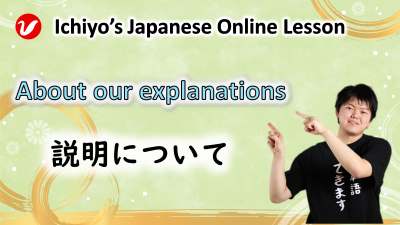We often use strange English translations on this site and our videos on purpose.

I’m Ichiyo and I represent “Ichiyo’s Japanese Online Lesson.”
Please read this page to understand our explanations correctly.
Ichiyo’s Japanese Online Lesson:
We want learners to have the correct Japanese skills. Therefore, we offer two types of services. One is the private Japanese lesson. The other is the “Daily Japanese Mail Support” service. You can learn Japanese with us anywhere in the world.

About our English
We usually use American English. This is because Japanese people have been learning American English since World War II. Moreover, we have an English staff from the Philippines. If you find any mistakes on this site, please let us know.
About our English translations
Sometimes, we cannot translate Japanese sentences into English correctly. This is because there are many specific Japanese expressions that English does not have. Therefore, we often use strange English translations for English speakers to explain specific Japanese expressions.
For example, both「5時間かかった。」and「5時間もかかった。」are often translated as “It took 5 hours.” However, the nuance of the two sentences is different.
This sentence just states the fact.
| Japanese Sentence | 5時間かかった。 |
| Common English Translation | It took 5 hours. |
This sentence has「も」after「5時間」. In this sentence, it indicates “too many than I expected.”
| Japanese Sentence | 5時間もかかった。 |
| Common English Translation | It took 5 hours. |
Therefore, if we translate「5時間もかかった。」into English exactly, it becomes like this.
| Japanese Sentence | 5時間もかかった。 |
| Our English Translation | It took 5 hours and the time is longer than I expected. |
Here is another example.
If we translate「鈴木さんは元気です。」using natural English, it is often translated as “Suzuki is fine.” However, it may seem strange to English speakers if we translate it as “Suzuki-san is fine.” The Japanese language is closely related to our hierarchical relationship.
| English Sentence | Suzuki is fine. |
| Japanese Sentence | 鈴木は元気です。 |
“Suzuki is fine.” is「鈴木は元気です。」in Japanese. If the speaker is not a higher-rank person than Suzuki, the speaker becomes rude to Suzuki. We can guess that the speaker is of the same rank person as Suzuki or of a higher rank person than Suzuki from the sentence.
| English Sentence | Suzuki-san is fine. |
| Japanese Sentence | 鈴木さんは元気です。 |
「さん」is an honorific title used when we say a person’s name. Therefore, when we hear「鈴木さんは元気です。」, we know the speaker respects Suzuki.
For these reasons, we sometimes use unnatural English translations to explain specific Japanese expressions. If you don’t know why we use unnatural English, you may not understand the Japanese expression. Please make sure you understand it. If you are our “Daily Japanese Mail Support” member, we will answer your questions and teach you Japanese every time until you understand it.
About our Vocabulary charts
This is an example of a vocabulary chart we use.
| Key Word | 警察署 |
| Hiragana | けいさつしょ |
| Romaji Reading | keisatsusho |
| Meaning | police station |
If the cell with “Hiragana” is blank, it means the word is not written in hiragana. We only write it in katakana.
| Key Word | アメリカ | プレゼント |
| Hiragana | ||
| Romaji Reading | amerika | purezento |
| Meaning | America | present, gift |
Therefore, writing these words as「あめりか」and「ぷれぜんと」is unnatural. 「アメリカ」and「プレゼント」are katakana vocabulary.
The Video
Our main YouTube channel: Ichiyo’s Japanese YouTube Channel
Our sub-YouTube Channel (Japanese vocabulary videos): Ichiyo’s Subchannel
